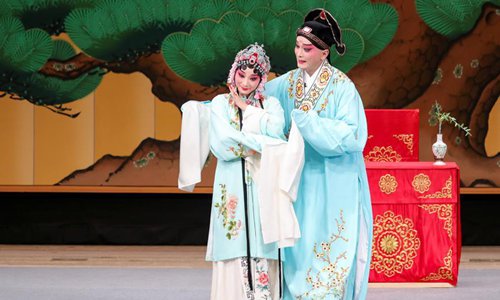China establishes world’s largest language resource library, covering four types of endangered dialects: China’s Ministry of Education
Source: Global Times Published: 2020/10/11 18:53:26 Last Updated: 2020/10/11 16:53:26

Artists perform Kunqu opera masterpiece "The Peony Pavilion" to mark the 100th anniversary of Chinese theater legend Mei Lanfang's visit to Japan in Tokyo, capital of Japan, Oct. 2, 2019. Mei was one of the most respected Chinese artists of the 20th century and creator of the "Mei School" style of Peking Opera. (Xinhua/Ma Caoran)
China has established the world’s largest language resource library, covering four types of endangered dialects, China’s Ministry of Education announced on Sunday.
According to the official website of China’s Ministry of Education, the Chinese Language Resources Protection Project had gathered more than 10 million pieces of data on 123 languages and local dialects across the country, becoming the largest library for language resources in the world.
During the implementation of the project, a total of 103 investigative field surveys on endangered Chinese dialects were completed, laying a good foundation for the protection and inheritance of dialect culture.
Experts proposed four types of endangered dialects including the dialects used in some special populations such as native Cantonese speakers in the Macao Special Administrative Region and the dialect used in Northeast China’s Heilongjiang Province, the Putonghua-mixed language based on Chinese dialects used by the Han people, some dialects formed due to political, military and economic migration elements, and some dialects formed at the borders of different regions across China.
According to the ministry, South China’s Guangdong Province is very rich in language resources and the number of survey locations established in the province ranks second in China. Cantonese is one of the main dialects spoken in Guangdong Province, with 42 survey points established. In addition, two Cantonese survey points have been established in the Hong Kong and Macao special administrative regions.
Opening some extra-curricular classes to learn dialects at schools and local opera performances based on various dialects like Cantonese Opera and Kunqu Opera are some of the programs the project will support.
Global Times
Posted in: THEATER,CULTURE & LEISURE